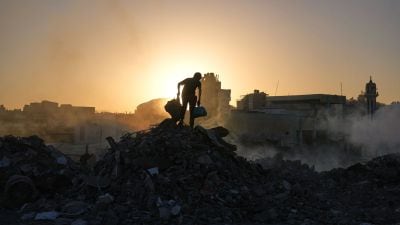It was an unusual decision to return to a place from which most young people seek to migrate in search of a better future. The Sunderbans is the largest delta in the world, with.a long history of exploration and rebellion. Here, nature and civilisation are constantly at loggerheads. Located to the south-east of Kolkata, the deltaic region is an ever-changing landscape of land, water and forest, where hunger drives humans and into tiger territory. Already one of the poorest regions in the world, the Sunderbans is now facing the cascading effects of climate change in the form of intensifying cyclones.

Though many researchers believe that humans will, ultimately, have to leave the Sunderbans, the islands have been inhabited for centuries and developed unique rituals and traditions. “Unlike most places, people have a close understanding with the ways of the water, the animals and the forest, which is essential for our survival,” says Mondal. His theatre is made of such stories.
Story continues below this ad
Mondal was born and raised on the Basanti islands, where his parents migrated from East Bengal during the Partition. Pointing at a bustling Matla Bridge that connects Basanti with the main railway station, Canning, he says, “Until the bridge came up, people used to wait for low tide, roll their clothes above their knees and wade to the other side. When there was a wedding, the groom’s party would come by boat. There would be a nachni, a man performing as a woman, who would hold us in a thrall. This tradition is coming to an end. I have seen people catch fish with their bare hands. If anybody sponsors us, we could tell raw stories that India has not heard,” he says.
In 2016, he made Jeebon Pur’er Golpo, based on the lived experiences of regular women, whom he cast as actors. The play articulated the problems they faced after being married off at a young age, between 16 and 23. “I travel through the islands, meet people, hear their histories and script them. After I left NSD, I have barely done plays by other playwrights,” he says.
He goes off for 10-day stretches with fishing boats and comes back having seen “magic elements in nature”. “In late summer, if you go deeper into the coastal Sunderbans, you will see a long, black chain, like a snake in the water. These are crores of mangrove seeds floating together, each seed bobbing in the water,” he says. “I have seen that fishermen are quiet and peaceful in the water but turn aggressive on land and start drinking,” he adds.
Bhalo Monder Golpo, a play made in 2013-14, catches this complexity through the story of two brothers, Bhalo and Mondo. While Bhalo got a job and left the Sunderbans, Mondo could not find employment. He lays around, drinks and his life gets very complicated. The play was a lens to show society about the problems of unemployment and addiction.
Story continues below this ad
 Sajal Mondal in his theatre workshop with the children at Sunderbans. (Courtesy: Sajal Mondal)
Sajal Mondal in his theatre workshop with the children at Sunderbans. (Courtesy: Sajal Mondal)
Mondal’s first encounter with performance was as a child, when he used to take food for his father who sold onions and garlic. The market was alive with all kinds of performances. A vendor would sell ointment by singing about it. A street performer would attract a crowd by demonstrating a trick. Their ways of speaking, throwing their voice in song and using their bodies made deep impressions in Mondal’s mind. It was at the marketplace that he was approached by a member of the local sports club to act in a play with other children to celebrate their annual day. This led him to Rabindra Bharati University in Kolkata where he chose the drama department.
It was at Rabindra Bharati that Mondal felt a new self unfolding. He changed his looks, started wearing bell bottoms and dyed his hair red. He also did a lot of theatre, students’ films and ad campaigns before he graduated in 2000. In 2008, he joined NSD where theatre veterans Amal Allana was the chairperson and Anuradha Kapur the Director. This was where Mondal “learnt to connect design and ideas of theatre to what was happening around the world”.
The Sunderbans has a long tradition of theatre, with ritual performances centred around deities such as Bon Bibi and Manasa. “After I returned from NSD, I went around meeting the local folk artists. They have a free and flexible style of acting. I felt a development taking place in myself—I learnt how to integrate the pedagogy imbibed in my theatre education with the way local artists work,” he says.
Without any funding source, Mondal is using his earnings from films— he had two releases during Durga Puja, Raktabeej and Bagha Jatin — to develop a theatre space behind his house. It is a large space with no walls and a fabric-covered canopy supported by pillars. An attached room is for practitioners who want to stay and work out their ideas of theatre. The highlight of the Mangrove Theatre is the annual Shishu Mela or Children’s Fair in October, an event for which the local children wait an entire year. In 2023, it included a workshop on theatre clowning.
Story continues below this ad
The last performance at the space was in December 2023 — an event to felicitate the achievements of a local boy, Somen Debnath, who had returned home after covering the world on a bicycle to spread awareness for HIV/AIDS. Debnath had started his journey in 2004. At present, another work is in progress at the Mangrove Theatre, involving children who imagine stories about themselves and their surroundings based on word prompts. “I make theatre to show them that it is possible to live in a different way, in different worlds,” he says.



 Sajal Mondal in his theatre workshop with the children at Sunderbans. (Courtesy: Sajal Mondal)
Sajal Mondal in his theatre workshop with the children at Sunderbans. (Courtesy: Sajal Mondal)





























